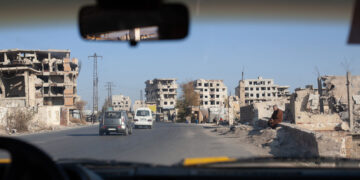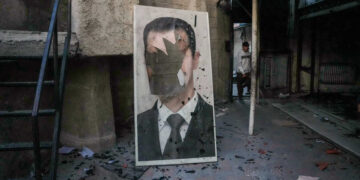Rena Netjes is a Dutch journalist and researcher who has reported extensively from Syria throughout its war. She was previously the Cairo correspondent for Parool newspaper and BNR radio in the Netherlands.
Joy at the abrupt fall of the Assad regime prevails across Syria, where the displaced can finally leave their tents and go home. But hopes for better living conditions mix with the fear of what the rebels led by Islamist militia Hayat Tahrir al-Sham (HTS) will bring as the new authorities in Damascus. There are other anxieties, too—of how remnants of the old regime could corrupt Syria's fragile transition, and the threat of extremist groups like ISIS that still have a foothold in the country.
Traveling across Syria from north to south this week, from Aleppo to Damascus, I retraced the lightning rebel offensive that in just days ended President Bashar al-Assad's rule and 54 years of the Assad family dictatorship. I met Syrians elated and relieved at the fall of the Assad regime, even if they are unsure of what the future holds. Whatever their view of HTS, which has controlled Idlib province for several years, every Syrian I spoke with said that without the HTS-led offensive, Assad would still be in power, and that enough is reason to celebrate now.
"This is the third day without Assad, and the sun is shining in Syria," said Khaled, a young man in the small town of Tel Ar outside Aleppo. "Under the Assad regime, Syria was clouded." Khaled, who is originally from Aleppo, Syria's second city and commercial hub, spent six months in regime detention. He was ready for a new Syria: "It's up to us. The whole world is watching."
Khaled travels every day now into Aleppo, to check on his city—something he had not been able to do since the regime retook it from rebels in a punishing siege in 2016, under heavy Russian bombardment. "Eastern Aleppo is still exactly how we left it," he said. "Nothing changed. The area is in ruins."
An hour south of Aleppo, we passed Maaret Nu'man, a town in southern Idlib province famous of its anti-Assad protests throughout the uprising-turned-civil war. From there, we drove through Hama, then Rastan, then Homs. Everywhere, the level of destruction was enormous.
I met Syrians elated and relieved at the fall of the Assad regime, even if they are unsure of what the future holds.
- Rena Netjes
In Homs, I met Amar and her sister in the street, near the city's central clock tower. They were waving the three-starred flag of Syria's revolution and both had it painted on their faces. While throngs of people were celebrating around the clock tower—the site of early protests against the Assad regime in 2011—the sound of gunshots could be heard not far away. Later in the evening, some residents relayed stories of former shabiha, the notorious pro-regime militia, who were still out on the streets in some neighborhoods of the city.
Two brothers, including my colleague, returned to their family home in Homs, which a regime officer and member of the shabiha had taken over during the war. In the street outside, I spoke to a commander from the Syrian National Army (SNA), the Turkish-backed militia that controls pockets of northern Syria. He had just returned only an hour ago from Latakia, on the coast, the country's Alawite heartland. "We want to let them know that we are not looking for revenge," the commander told me. "We had so many years of killing in Syria, we need to turn the page and start to build a new life together, as Syrians."
He said the Alawites he met in Latakia feared reprisals and were surprised that the SNA commander and his men came, in his words, "with a rose to reach out to them." Despite the coast's reputation as a hub of regime support, given its sizeable Alawite population, not only in cities like Latakia and Tartous but the many mountain villages above them, "I was shocked by the poverty I saw there," he added. "They have nothing. It was even worse than in our areas [of the north]. They suffered from the regime like we did."
The commander still worries about revenge attacks on people seen as loyal to the Assad regime. "It is now really up to all of us Syrians to succeed or fail."
The next day, we continued to Damascus. The city's suburbs, formerly rebel-held areas, remain in complete ruins. People were celebrating in the center of Damascus, around the traffic circle of Umayyad Square. Most striking about the Syrian capital today is the poverty, with many children and adults begging in the streets—something I have never seen in rebel-held Azaz and Idlib in northwest Syria over the past decade.
In Bab Touma, a mixed Christian-Muslim area in the Old City of Damascus, I met Rami, who is Greek Orthodox. "We don't know whether we will be happy or not, the situation is not yet clear," he told me, expressing the uncertainty of the Christian minority. "A certain amount of time must pass before things will become clear." But he said that services have already improved, such as electricity. "We used to have 1.5 to 2 hours a day, now we have 3 to 4 hours. And they have promised us that in a month, we will have electricity 24 hours a day."
The wait for bread at a bakery used to last five hours. "Now, we have to wait an hour."
Rami said that although "the Assad regime was good for Christians, the situation in general was bad. The economic situation was zero—there was nothing." Many Christians left the country out of poverty. "I am a state employee and my income is $10 a month," he said. "It is not enough to survive," which is why he also works in a restaurant. A trip to the supermarket would cost an entire monthly salary. "Many have become beggars," he said.
He heard that everything was cheaper in the opposition-held areas, while in Damascus, they had no heating oil. "We are dying of cold," he said. "We are dead here, honestly, we are dead here in Syria." The next few months, he added with resignation, will make clear whether things will change at all for the better.
Most striking about the Syrian capital today is the poverty, worse than I had ever seen in rebel-held Azaz and Idlib in northwest Syria over the past decade.
- Rena Netjes
At the al-Yasoun restaurant in Bab Touma, I met its owner Emad, also a Greek Orthodox Christian. He is a mechanical engineer and owns the restaurant and a hotel, all in a historic courtyard house in the Old City, its central fountain and intricate wood paneling typical of the city's preserved Ottoman-era houses. The staff in the restaurant is a mix of Sunnis, Christians, Druze and Alawites. "I expect a positive change," Emad said. He is optimistic that the shortages of everything, from oil and gas to food and electricity, will end, and that basic services will return. "We don't know HTS well, but they promised us that it would get better," he insisted. "Bashar al-Assad's clique was very bad. This government must become a mix. There is no point in the government consisting of only one sect."
In Damascus, many people said they had been barred for years by the regime from returning to their homes in the city's outskirts—areas that, like eastern Aleppo, were once held by the opposition and then starved and besieged by Assad's forces into surrender. "The regime did not allow them to return to rebuild their homes," Emad told me. "I know a family who has a five-story building in Jobar and the regime did not allow them to go back. If those who live here could not return to their homes, how would Syrians in Europe do that?"
"I expect the change will be better," he added. "I am optimistic."
In a tribal guesthouse called a madafa in a green area on the outskirts of Damascus, I met a local tribal sheikh, Nawaf al-Mulhim, who was planning to visit Alawite, Shia and Christian villages between Damascus and Homs. "We must tell them not to be afraid," he said. "We must give guarantees to our Alawi and Christian brothers."
"These Alawite and Shia communities lost everything," said one activist from Homs. "It is very important that we have them on board in an inclusive new Syria. The nice words have to be translated into actions on the ground, otherwise people will start to demonstrate again."
This activist had survived the brutal siege of the Homs neighborhood of al-Waer, which ended in 2017. He was displaced to northern Syria in the notorious green government buses that came with every "evacuation" agreement, when a besieged rebel-held area finally surrendered to Assad's forces. He is now part of the new interim administration in Homs, along with many fellow Homsis who also endured the siege of al-Waer and were forced out of their city by the regime.
"Our greatest fear in Homs is that incidents with shabiha will increase and become uncontainable," he said, claiming that there are thousands of shabiha militia members wanted for their involvement in killings and torture across Homs province. "We are not talking about the forcibly conscripted," he added. "For them, we opened two reconciliation centers here in Homs." I saw dozens of young men queuing in front of one so-called reconciliation center, where they hand over their government IDs and weapons to the new rebel authorities, next to the clock tower in the center of Homs.
Cities like Damascus and Homs have always have been ethnically and religiously mixed, a legacy that Syrians will want to protect after Assad. Back in Damascus, I met Linda, a Sunni woman who owns a beauty shop in Bab Touma. "I am of course very happy that Bashar al-Assad is gone, but I do not want him to be replaced by an authoritarian," she said.
I met her alongside a Druze woman named Mirvat. They noted with pride that they have been friends for 22 years.
Life under the Assad regime, Linda said, was like "living in a closed bottle." But she was worried about HTS—that it is a jihadist group, its fighters all coming from the conservative countryside of Idlib, flying an Islamic flag. "I am also a Muslim, but I am scared," she said.
"The only positive thing was that the regime fell. They promised that the electricity and diesel situation would improve quickly," referring to HTS. "We want this, but it was not our fundamental request. We want security over diesel and electricity." Linda said she would bring a Christmas tree to her shop in Bab Touma "to support the Christian community here."
Her friend Mirvat was more optimistic. "We have been freed from Assad and that is a great joy," she said. "Some are afraid, but I believe the change can only be for the better."





































